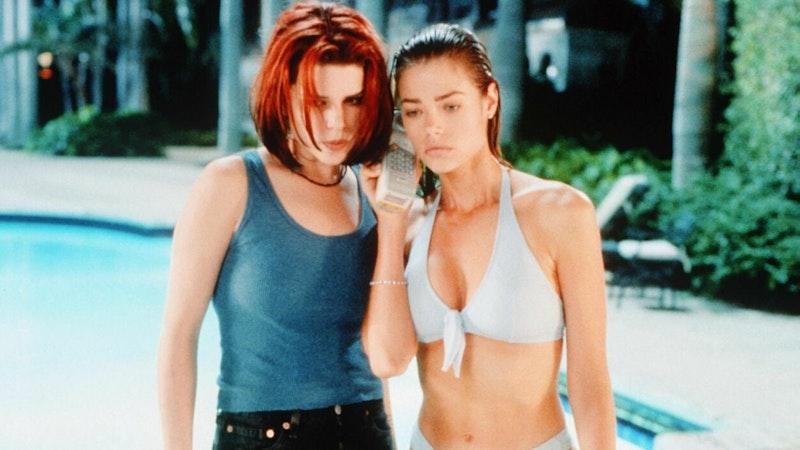Noir is a sleazy genre, but even by those standards John McNaughton’s Wild Things has a reputation. Critics described it as “tawdry” “lurid” “trash” without a “single redeeming feature.” Those who didn’t pan it outright framed it as a guilty, lubricious pleasure.
The movie’s decadent charge comes in part from its timing; released in 1998, at the tail end of the neo-noir erotic thriller revival, its sexploitation moves were more explicit than many of its predecessors. Critics were also reacting to its politics. Early noirs, like Double Indemnity or Kiss Me Deadly, were about bad women who get theirs in the end—patriarchy wobbles, but eventually rights itself, restoring at least provisionally a familiar moral order. Wild Things in contrast, pushes the patriarchal moral order off a boat and holds it under brackish water. It’s trash the way John Waters’ films are trash—as a deliberate sneer at the straights and their tedious good taste.
Initially, it looks like the protagonist of Wild Things is clean-cut heartthrob high-school guidance counselor Sam Lombardo (Matt Dillon). Sam opens his brown eyes wide in innocence as he’s accused of rape by wealthy spoiled teen Kelly Van Ryan (Denise Richards) and troubled trailer-trash Suzie Toller (Neve Campbell.) When Suzie breaks down on the stand and confesses it was all a spiteful plot, Sam’s suddenly in a position to sue the Van Ryans’ for millions. That makes Sergeant Ray Duquette (Kevin Bacon) suspicious. He thinks that Suzie, Kelly, and Sam were working together the whole time.
That only suggests a few of the plot twists; the narrative slides through the swamp. Kelly, Suzie and Sam are involved in a three-way sexual relationship, which rapidly deteriorates into jealousy, fear and violence. Suzie appears to be the weak link—but appearances are deceiving.
Dillon gives a wonderful curdled performance, as his bluff, virile, nice-guy exterior wilts, turning first to calculated menace and then to vapid inadequacy. By the last scenes his personality is reduced to his unbuttoned tropical shirt; he’s a dim himbo who thinks his good looks entitle him to sex and money. The film systematically takes apart Ray Duquette too. The earnest, angular cop ready to break the rules in pursuit of justice is just a self-serving sadist. The title, Wild Things, is generally taken to be a reference to the female characters, but it's Bacon as Duquette who’s the most reptilian, oozing unpleasantly across the screen in his ill-fitting jackets, appraising Kelly in her semi-transparent swim suit, or boasting about murdering one of Suzie’s friends, whose name he can barely remember.
The male heroes wilt into villainy and self-parody even as Suzie shucks off her fear and confusion and pulls on the sleek bathing outfit of the femme fatale. By the conclusion of the film we learn that the plot was her idea; she blackmailed Sam, bamboozled Duquette and seduced Kelly. Cops, guidance counselors, rich girls—the bisexual kid from the wrong side of the tracks beats them all, and has, by all appearances, a lovely time doing it. Neve Campbell, hair dyed newly blonde, cheerfully compares herself to Medea as she poisons Sam and pushes him off his own boat.
Suzie’s lawyer, Kenneth Bowden (Bill Murray), hands over the safety deposit box number. “Be good,” he tells her. The joke is that Suzie isn’t good—she just murdered two people and stole millions! But the joke’s also that the film enthusiastically dumps various bodily fluids on the idea of goodness. In the best noir tradition, cops are corrupt, authority figures are useless and impotent, and every moral compass is busted. Older noirs often present that failure of hierarchy as a crisis. But in Wild Things, it’s exhilarating.

